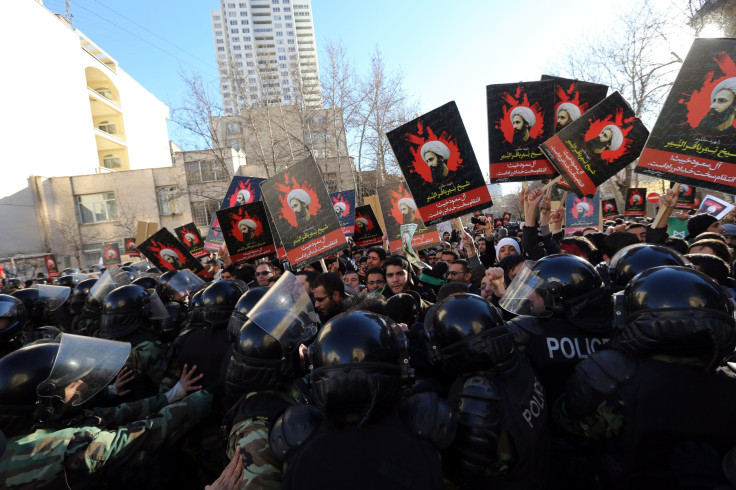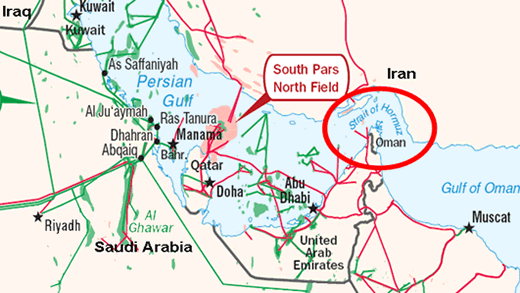Breakdown In Saudi Arabia Ties With Iran Won't Cause Oil Market Disruption Despite Fears

The breakdown in diplomatic ties between Saudi Arabia and Iran pushed oil prices higher early Monday amid fears that a conflict could choke oil exports or block key trade routes in the region. But a major disruption in supply isn’t likely in the near term, owing to the global glut of crude and international interests in protecting transit hubs, energy analysts said Monday.
“Talk is not going to send prices up $20 to $30 a barrel,” said Dominick Chirichella, co-founder of the Energy Management Institute in New York. Still, he added, “The sheer political risk will keep the floor in the price of oil.”
Oil futures Monday climbed as high as 3.5 percent in New York after the Saudi government severed ties with Iran over the weekend. After the kingdom executed a prominent Shiite cleric, demonstrators in Iran attacked the Saudi Embassy in Tehran. In response, Saudi Arabia’s foreign minister Sunday gave Iranian diplomats in the kingdom 48 hours to leave.
The political meltdown heightens the risk of conflict near the Strait of Hormuz, the world’s most important choke point for oil exports. About 16 million barrels a day of crude — or 20 percent of the oil traded worldwide — move through the 2-mile-wide shipping lane, which separates the Persian Gulf from the open ocean. Iran in 2008 threatened to close the strait and wreak havoc on global oil markets if the United States or Israel attacked the country.

“Any blockade could really deal the global economy a huge blow,” said Fadel Gheit, a senior oil and gas analyst at Oppenheimer Holdings in New York.
That’s why a shutdown at the strait is unlikely, he said. Other nations would likely step in to protect oil supplies and avoid a global recession, as U.S. military officials pledged to do during the 2008 squabble over the critical shipping passage.
“All the major countries in the world — the United States, Russia, China, Europe — have no hesitation when it comes to keeping the Strait of Hormuz open,” Gheit said. “Nobody wants to go there.”
If armed conflicts do hamper Saudi and Iranian production, the world still has ample crude supplies to weather the dip. Oil stockpiles swelled last year to a record of almost 3 billion barrels because of strong production in OPEC and from U.S. shale formations, the International Energy Agency reported in November.
The “brimming crude oil stocks” offer countries “an unprecedented buffer against geopolitical shocks or unexpected supply disruptions,” the Paris-based agency said in its monthly oil market report.
That stockpile will only grow as Saudi Arabia continues boosting crude oil output to record highs.
Analysts said the Saudi government won’t likely alter its policy of pumping oil to drive down global prices and crowd out competitors. The low oil prices give the Saudis an advantage over Iran, which has less of a financial cushion against falling crude revenues.
“There’s no question that Saudi Arabia will keep oil prices as low as they can,” Gheit said. “Relatively speaking, it will hurt them, but it will destroy the Iranian economic structure.”
Saudi Arabia last year posted a record budget deficit of nearly $98 billion, or 15 percent of its gross domestic product. The kingdom says it still holds more than $700 billion in foreign reserves, ensuring its economy could withstand a few more years of oil prices below $40 a barrel.
Brent crude, the global benchmark, and U.S. crude both plunged by nearly two-thirds last year from their peaks in June 2014, driven by the global oversupply of crude and waning demand in China and emerging economies.
Brent crude fell 0.4 percent Monday afternoon from its morning rise to $37.13 a barrel. West Texas Intermediate, the U.S. marker, dipped slightly to $36.89 a barrel.
Iran’s anticipated return to international oil markets this year has been a key factor pressing prices over the past few months. Iranian officials said the country could boost exports by 500,000 to 1 million barrels per day once Western sanctions are lifted. Gheit and other analysts said Iran’s output will likely be much lower, but any influx would still exacerbate the supply glut and keep prices low throughout the year.
Iran has the fourth-largest oil reserves in the world. Sanctions tied to the country’s nuclear program cut deeply into its oil and natural gas revenues, which plunged to $56 billion in the 2013-2014 fiscal year, from about $118 billion in the 2011-12 fiscal year, the International Monetary Fund estimated.
The need to boost revenues from oil exports could restrain Iran in its latest fight with Saudi Arabia, said Chirichella, the Energy Management Institute analyst.
“Iran wants to sell oil more than they want to get into a battle with Saudi Arabia, any more than they already have,” he said. “Iran has way more to lose [than the Saudis] by this continuing.”
© Copyright IBTimes 2024. All rights reserved.





















